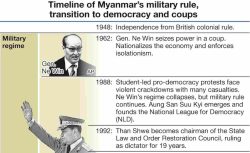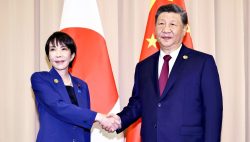15:58 JST, October 16, 2024
With the advancement of digital technology, information that is difficult to discern as true or false is now rampant on the internet. In an era of deepening confusion, newspapers, which accurately convey facts, have an important mission and role to play.
In recent years, there has been concern about the use of artificial intelligence to steer public opinion through fake videos.
In the United States, a video of President Joe Biden singing a Russian-language song and dancing in the White House was spread in December last year. It is believed that Russian state media used AI to reproduce his facial expressions and the tone of his voice in an attempt to meddle in the upcoming U.S. presidential election in November.
During India’s general election campaign this year as well, a video of Prime Minister Narendra Modi jumping up and down and raising his hands to inspire a crowd spread on social media, with the disseminator criticizing Modi as a dictator.
This is an age when anyone can easily create sophisticated fake videos, and Japan is now in the midst of a lower house election campaign. Behavior that apparently misleads voters with false information could shake democracy. Correct information is essential for free and fair elections.
According to a Yomiuri Shimbun survey, 85% of all respondents said they “expect” newspapers to convey accurate information. When asked what sources of information they trust for online news, the most common answer also was “newspaper companies” at 52%.
Newspaper companies dispatch reporters to various locations and interview many people involved to confirm the facts before reporting information. They also engage in multifaceted analysis based on scientific data and expert opinions. They must meet the expectations of readers who demand correct information.
Disinformation also hinders rescue operations during natural disasters that require prompt action. The Noto Peninsula Earthquake was followed by a spate of images that appear to have been doctored from video images of tsunami after the 2011 Great East Japan Earthquake and false information about people affected by the disaster.
A system in which advertising revenue increases based on the number of views amplifies such phenomena. For this reason, stimulating information tends to be emphasized, and this is called the “attention economy,” which prioritizes people’s interests.
There is a need for a system that can confirm the reliability of information. An association of media organizations and other entities are developing digital technology called “Originator Profile,” which identifies the disseminators of information on articles and other content on the internet.
Newspaper Week began on Oct 15. “I will not get carried away; I read and think” was chosen as the representative slogan.
A 42-year-old male company employee, who created the slogan, said, “When I read printed words in newspapers, I can think about things neutrally and calmly.” It is hoped that print culture, which is easy to remember and allows readers to think things over, will be cherished.
(From The Yomiuri Shimbun, Oct. 16, 2024)
Top Articles in Editorial & Columns
-

Myanmar Will Continue Under Military Rule Even After Election, Ex-Ambassador Maruyama Says in Exclusive Interview
-

40 Million Foreign Visitors to Japan: Urgent Measures Should Be Implemented to Tackle Overtourism
-

Expansion of New NISA: Devise Ways to Build up Household Assets
-

China Criticizes Sanae Takaichi, but China Itself Is to Blame for Worsening Relations with Japan
-

Withdrawal from International Organizations: U.S. Makes High-handed Move that Undermines Multilateral Cooperation
JN ACCESS RANKING
-

Univ. in Japan, Tokyo-Based Startup to Develop Satellite for Disaster Prevention Measures, Bears
-

JAL, ANA Cancel Flights During 3-day Holiday Weekend due to Blizzard
-

China Confirmed to Be Operating Drilling Vessel Near Japan-China Median Line
-

China Eyes Rare Earth Foothold in Malaysia to Maintain Dominance, Counter Japan, U.S.
-

Japan Institute to Use Domestic Commercial Optical Lattice Clock to Set Japan Standard Time



















